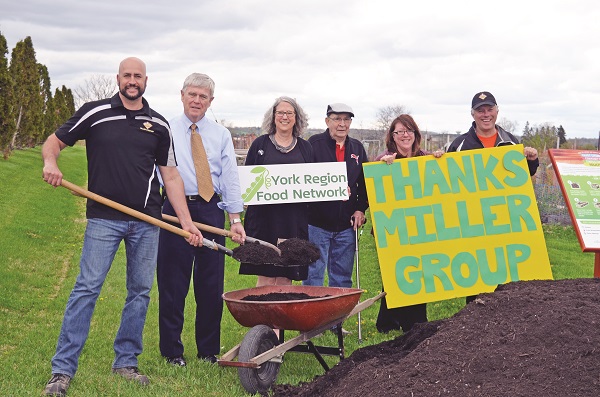General News » News
Get your hands dirty for Community Garden season
May 31, 2018 · 0 Comments

By Brock Weir
Ivor Roberts is hard at work tending to his tomatoes, zucchini, cucumber and lettuce plants.
The 79-year-old Aurora resident loves to garden and sees the value of getting out and getting your hands dirty as well as the pride of producing your own food.
He’s an active member of the Aurora Community Garden, a plot of land on Industrial Parkway South, divided up into plots shared by local gardeners, facilitated by the York Region Food Network; a plot of land that that isn’t quite large enough to keep up with demand.
But, now that the warmer weather and Community Garden season is here, it’s doing its best to keep up.
Mayor Geoff Dawe was on hand earlier this month to launch the Community Garden Season. Joined by Joan Stonehocker, Executive Director of the York Region Food Network, and representatives from Miller Waste, who dumped off a fresh load of compost to help keep the veggies growing, the occasion was a way to highlight both the value of – and demand for – such a space.
“It’s nice to have community gardens that are directed by the community,” says Ms. Stonehocker. “When a group comes together and asks for space, that is a perfect opportunity to put in a community garden. We always have a waiting list as gardeners come back year after year, but once they decide to leave, we move down the waiting list.”
For those too late to make the cut, Ms. Stonehocker says they try to direct the would-be gardeners to a similar plot maintained by Windfall Ecology Centre, but they too are chock full of enthusiastic people working the soil.
Community Gardens are a perennial issue in Aurora.
There have been no shortage of local gardeners coming to Council clamoring for more space, but as much enthusiasm as there is around the table for more, efforts always stumble when neighbours object to them being built close to their respective yards.
“It’s not really attractive, but in the right places, it is good,” says Mr. Roberts.
This is a view shared by Mayor Dawe who said finding the right location is key moving forward.
“There is always a challenge as to where you want to put them and it is the same issue with trails: when they go in after the fact, it causes a lot of angst, so it requires a little bit of forward planning,” says Mayor Dawe. “I would think somewhere out in the 2C area would be an opportunity [for more gardens] because we have a lot of space out there. It might be too late in terms of the Highland Gate development area, but there might be an opportunity…to incorporate some community gardens in there as well.”
The Hydro Corridor, he adds, might be another – albeit contentious – possibility.
“Some people have a problem with that, and I understand that, but I don’t have an issue with it going under the Hydro corridor. To me, it is wasted space, so why not use it for something? Down at the Finch Subway, they use it for parking, so I think community gardens would be a much better use of that space.”
There is always room for more community gardens, adds Ms. Stonehocker.
Community gardens, she says, foster an understanding of where your food comes from and, having fresh food from your own back yard or your community garden also “brings the community together.”
“There are all sorts of wonderful things from community gardens; it is good for health and it is good for the environment,” she says. “I think there are all sorts of misconceptions about community gardens and one is that they are going to solve food insecurity, which they aren’t. There is no way we’re going to grow enough food to solve all of that. Another misconception is they are bothersome, and I think they are quite the opposite. They bring people together, it is an education for young and old alike, and there are lots of opportunities to get involved with your neighbours.”
The York Region Food Network has been managing community gardens in York Region for over 25 years, starting with the first plot in Markham. From these early days in 1993, the program has expanded to four York Region municipalities.
“Our Urban Agriculture activities touched the lives of over 1,300 residents in 2017 by: offering land to those without space to grow, teaching children the importance of healthy soil and healthy food, supporting school gardens, and providing free food growing workshops,” says the Network.











